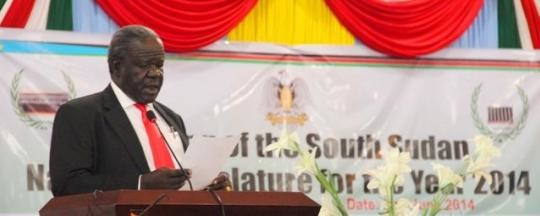South Sudan’s National Assembly has voted to approve a bill regulating and restricting non-governmental organizations, including limiting the number of foreign aid workers employed.
The parliament passed the bill yesterday in its fourth reading in spite of objections from the opposition that 50 recently appointed members were not present.
Article 18 of the bill limits the number of foreigners employed by any NGO in South Sudan to 20%, according to a copy seen by Radio Tamazuj.
“Any Non-Governmental Organization shall… ensure that not less than 80 percent of the employees are South Sudanese nationals at all managerial, middle and junior levels.”
However, the bill does not define these levels nor say how staff should be categorized.
UN agencies, the International Committee of the Red Cross, Red Crescent and South Sudan Red Cross are exempted from registration under the new NGO law, but no exception is mentioned for other large international aid groups, which employ numerous foreign workers.
Registration as an NGO in South Sudan will require a “country agreement” with the government, according to Article 9.1.xi of the bill.
In order to renew their registration certificate, NGOs will be required to provide to the government performance reports, an audited financial report, asset lists, plans and budgets for the next fiscal year, and a list of national and international staff and their positions.
No aid group shall engage in activities other than those agreed upon with the government without prior written approval of the Registrar of NGOs.
As a separate act, the parliament also passed the Relief and Rehabilitation Commission bill. This bill establishes the commission as an organ to “supervise” aid groups in the country. The commission will fall under the oversight of the humanitarian affairs minister.
The two bills will become operational laws upon signature of the president or automatically after one month.
Protests from Minority Leader
Opposition MPs from the Democratic Change party objected to the passage of the two bills on several grounds. First, they said that the bills should have been treated in separate sittings and voted on separately rather than approved in one sitting.
The minority caucus plus seven other MPs opposed the NGO Bill, while three opposed the Relief and Rehabilitation Bill.
The leader of minority, Onyoti Adigo, criticized the speaker of the parliament for ‘illegally’ passing the bills in the parliament. Adigo, who leads the opposition Democratic Change caucus, said that the assembly should not have considered such legislation until after the arrival of the 50 SPLM-IO parliamentarians appointed under the terms of the peace deal.
The minority leader asked the parliament to separate the two bills because they cannot be passed together as one bill. MP Aleu Ayieny Aleu, the former interior minister and a member of the ruling party, also criticized the parliament for procedural errors in passing the bills. He said the parliament should pass bills in a legal manner so as not to contradict the country’s transitional constitution.
File photo: Speaker of the Assembly Manasseh Magok




